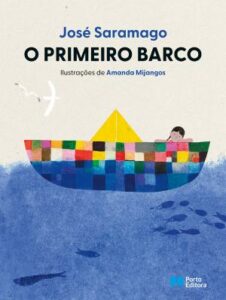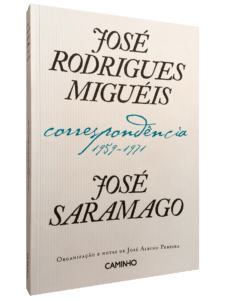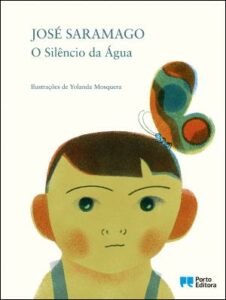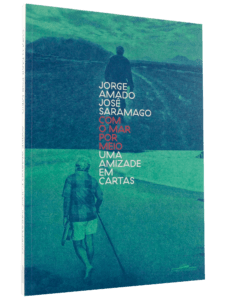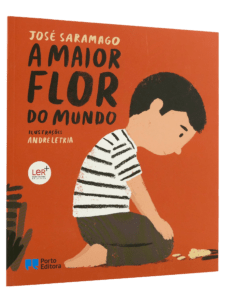Possible Poems
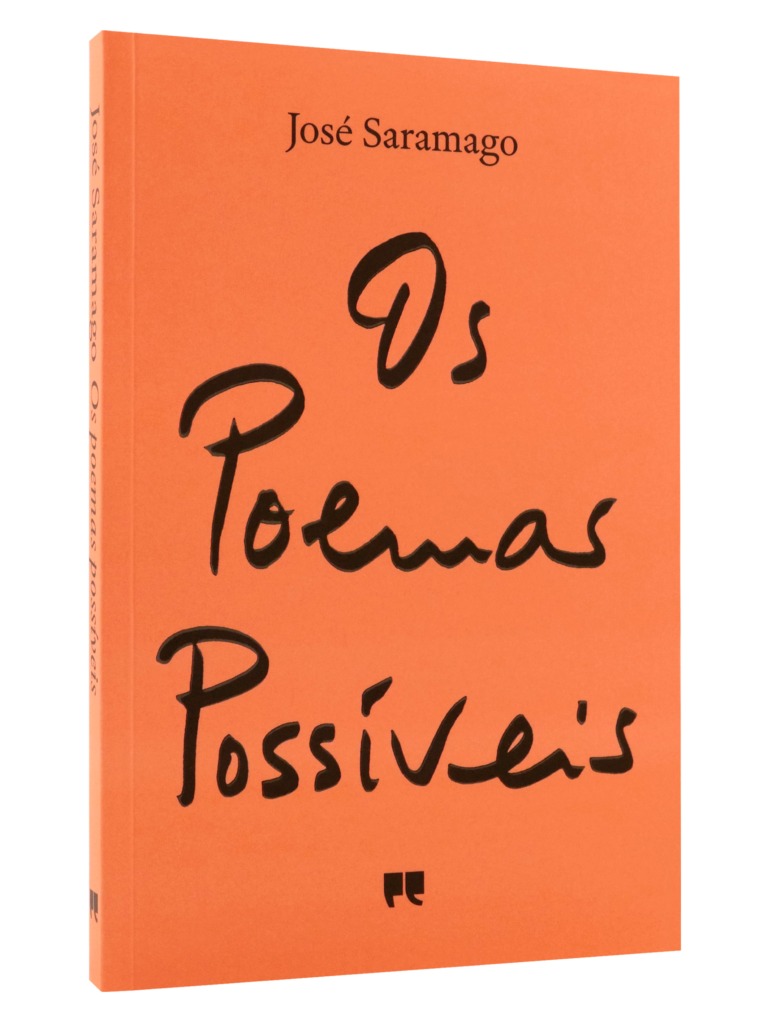
Deep down, I haven't stopped being a poet, but a poet who expresses himself through prose, and probably – and this is a flattering idea I want to have of myself – it's possible that I am a better poet today than when I wrote poetry.
Foundation
Portugal
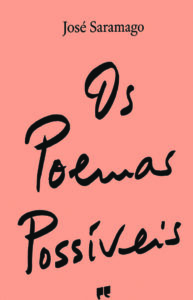
The calligraphy on the cover is by the writer Almeida Faria
«This world is no good, come another one. / We've been here for too long now / Pretending enough reasons. / Let's be dog dogs: we know everything / To bite the weakest if we command, / And to lick our hands, if dependent.»
In José Saramago's first poetic work, a poetry of freedom, fraternity and struggle is discovered. A fight in disguise, inside the words. Through the labyrinthine interior of breathing that inhabit all these poems, published for the first time in 1966. Let's say they were the "possible poems" of the time, when the censors spied on the souls of writers. And yet, Saramago's deep convictions are already clearly visible in poems like “Creation”: “God doesn't exist yet, I don't even know when / Even the sketch, the color will assert itself / In the confusing design of the passage / Of countless generations in this sphere . / No gesture is lost, no trace, / That the meaning of life is just this: / Make the Earth a God who deserves us, / And give the Universe the God that awaits.»
Diário de Notícias, October 9, 1998
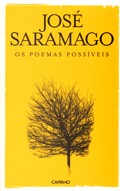
Editorial Path
1982, 7th ed., 2011
Language
Portuguese
«"Take a poet who is not tired,
A dream cloud and a flower,
Three drops of sadness, a golden hue,
A vein bleeding with terror.
When the dough boils and thickens,
"What kind of love a poet requires."»
«This world is no good, let another one come. / We have been here for too long / Pretending to have sufficient reasons. / Let us be dogs of the dog: we know everything / About biting the weakest if we are in charge, / And about licking hands if we are dependent.” In José Saramago's first poetic work, one discovers a poetry of freedom, fraternity, and struggle. A disguised struggle, within the words. Through the labyrinthine interior of breath that inhabits all these poems, first published in 1966. Let's say they were the “possible poems“ of the time, when censorship spied on the souls of writers. And yet, Saramago's deep convictions are already quite visible in poems like "Creation": "God does not yet exist, nor do I know when / Not even the sketch, the color will assert itself / In the confused design of the passage / Of countless generations in this sphere. // No gesture is lost, no trace, / For the meaning of life is this alone: / To make of the Earth a God worthy of us, / And to give to the Universe the God it awaits."” (Diário de Notícias, October 9, 1998)
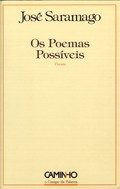
Editorial Path
1982, 7th ed., 2011
Language
Portuguese
«"Take a poet who is not tired,
A dream cloud and a flower,
Three drops of sadness, a golden hue,
A vein bleeding with terror.
When the dough boils and thickens,
"What kind of love a poet requires."»
«This world is no good, let another one come. / We have been here for too long / Pretending to have sufficient reasons. / Let us be dogs of the dog: we know everything / About biting the weakest if we are in charge, / And about licking hands if we are dependent.” In José Saramago's first poetic work, one discovers a poetry of freedom, fraternity, and struggle. A disguised struggle, within the words. Through the labyrinthine interior of breath that inhabits all these poems, first published in 1966. Let's say they were the “possible poems“ of the time, when censorship spied on the souls of writers. And yet, Saramago's deep convictions are already quite visible in poems like "Creation": "God does not yet exist, nor do I know when / Not even the sketch, the color will assert itself / In the confused design of the passage / Of countless generations in this sphere. // No gesture is lost, no trace, / For the meaning of life is this alone: / To make of the Earth a God worthy of us, / And to give to the Universe the God it awaits."” (Diário de Notícias, October 9, 1998)
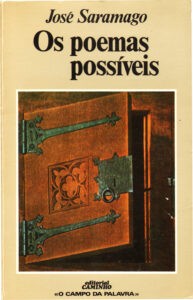
Editorial Path
1982, 7th ed., 2011
Language
Portuguese
«"Take a poet who is not tired,
A dream cloud and a flower,
Three drops of sadness, a golden hue,
A vein bleeding with terror.
When the dough boils and thickens,
"What kind of love a poet requires."»
«This world is no good, let another one come. / We have been here for too long / Pretending to have sufficient reasons. / Let us be dogs of the dog: we know everything / About biting the weakest if we are in charge, / And about licking hands if we are dependent.” In José Saramago's first poetic work, one discovers a poetry of freedom, fraternity, and struggle. A disguised struggle, within the words. Through the labyrinthine interior of breath that inhabits all these poems, first published in 1966. Let's say they were the “possible poems“ of the time, when censorship spied on the souls of writers. And yet, Saramago's deep convictions are already quite visible in poems like "Creation": "God does not yet exist, nor do I know when / Not even the sketch, the color will assert itself / In the confused design of the passage / Of countless generations in this sphere. // No gesture is lost, no trace, / For the meaning of life is this alone: / To make of the Earth a God worthy of us, / And to give to the Universe the God it awaits."” (Diário de Notícias, October 9, 1998)
Germany
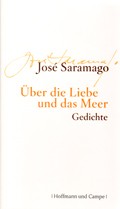
2011 (Translated by Niki Graça) (included in the work Über die Liebe und das Meer)
Language
German
Mag sein, die Welt gäbe es nicht, wenn ihr unsere Liebe fehlte.
»Die literarische Stimme Portugals.« Der Spiegel
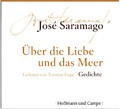
2011 (Audiobook – Voice: Torsten Enge)(included in the work Über die Liebe und das Meer)
Language
German
Die Gedichte des Nobelpreisträgers erstmals auf Deutsch José Saramago ist vor allem als Roman- und Prosaschriftsteller bekannt, obwohl er schon immer auch Lyrik verfasst hat. Die Liebe und das Meer, zwei wiederkehrende Motive in seinen Gedichten, wurden zum Motto dieser Auswahl.
»Die literarische Stimme Portugals.« Der Spiegel
Argentina
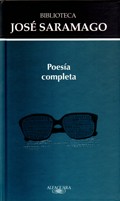
2010 (Translated by Ángel Campos Pámpano) (included in the work Poesía completa)
Language
Spanish
«"Let's close this door.".
Slowly, slowly, in our caigan clothes
As if they were undressing themselves.
And we are what we are, even if we are human.»
Foundation
This volume brings together, in a bilingual edition, all the poetry produced by the 1998 Nobel Prize winner for Literature: from the first poems written to the twenty-first year to the book The Year of 1993, published in 1975, a volume that contains themes and obsessions that became the spinal column of his novelistic work.
Philosophical poems, love poems about literary characters and about the contemporary world, in all of them the identity of this maestro of universal literature is discovered.
Spain
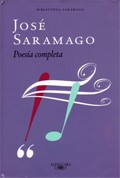
2005; 2011 (Saramago Library Collection) (Translated by Ángel Campos Pámpano) (included in the work Poesía completa)
Language
Spanish
Let's close this door.
Slowly, slowly, in our caigan clothes
As if they were undressing themselves.
And we are what we are, even if we are human.
Foundation
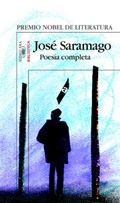
2005; 2011 (Saramago Library Collection) (Translated by Ángel Campos Pámpano) (included in the work Poesía completa)
Language
Spanish
Let's close this door.
Slowly, slowly, in our caigan clothes
As if they were undressing themselves.
And we are what we are, even if we are human.
Foundation
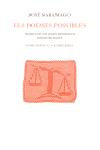
Editions 62
2005 (bilingual Catalan-Portuguese) (Trans: Josep Domènech Ponsatí)
Language
Catalan
Saramago, poet. An essential item that is not related to the Portuguese Nobel Prize winner. RITUALSi és altar el poem, sacrifico.En aquesta stone de lluna que es el versel coltell del vi guanya tall.Aquí m´he agenollat. No refusel cervol de la prada del meu somnial dard violent que el colpeix.
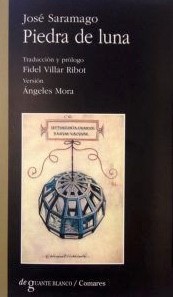
1999 (Translated by Fidel Villar Ribot) (included in the work Piedra de luna — 60 poems and 9 chronicles)
Language
Spanish
A selection of chronicles from This World and the Other: “The Words”, “The City”, “The Resistant Word”, “The Stone Eyes”, “The Gods Sell What They Give”, “My Grandfather, Too”, “Heart and Moon”, “A Leap in Time”, “Discourse Against Lyricism”.
Selection of poems from *Provavelmente Alegria*: “The poem is a granite cube”, “The first poem”, “Forge”, “Vow”, “The kiss”, “The words of love”, “I travel in your body”, “Where”, “White nights”, “The fruit”, “The silence is so deep”, “We walked on the waters”, “Blue water”, “Heart stone”, “Poem for Luís de Camões”, “On the island sometimes inhabited”, “It is a book of good faith”, “Madrigal”.
Selection of poems from The Possible Poems: “Ritual”, “The words are new”, “Question of words”, “Eloquence”, “Circus”, “Beach”, “Art of loving”, ”State of Nudity”, “Integral”, “Military exercise”, “Letter from José to José”, “To you I return, sea”, “To the gods without faithful”, “Speak for me, silence”, “Rule”, “Creation”, “In the silence of the eyes”, “We will not say mortal words”, “Clean hands”, “From me to the star”, “Sign of Scorpio”, “Declaration”, “Pride of D. João in Hell”, “Lament of D. João in Hell”, “Sarcasm of D. João in Hell”, “Romeo and Juliet”, “Juliet and Romeo”, “West side story”, “Don Quixote”, “Sancho”, “Dulcinea”, “Epitaph for Luís de Camões”, “I raise a rose”, "Fraternity," "Program," "Destiny," "Commonplace for a forty-year-old," "Poem with a closed mouth," "Psalm 136," "For time does not stop," "If I have no other voice," "Business.".
Italy
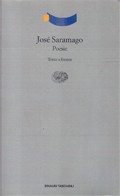
Einaudi
1996 (Translated by Fernanda Toriello) (included in the works Poesie and Le Poesie)
Language
Italian
«Piú che le parole e le immagini… ci vengono incontro le espressioni di chi ben sa di essere Poet e che può affermare che solo gli occhi del Poet Podeno Riscattare e Accendere di nuovi significati, fin a farne una 'lingua dell'altro mondo', le parole piú semplici e quotidiane‘.
Luciana Stegagno Picchio
This volume presents the due conclusion of the poetry of the Nobel Prize for Literature 1998: Possible Poems and Probably Joy. Il cousin, Le poesie possibili, came pubblicato in 1966, ma poi rivista and amended in 1982, tentatively, on the part of the «romanziere di oggi», di «grattare con unghia secca e ironica il Poet di Ieri». The second, probably happy, is the beginning of the 1970s, and will not rise to the same sensibility until now. Ed is a poetic opera that, splendidly, merits a long and successful visit to the light of the great narrative production of the successive period in the beginning, from the Handbook of painting and calligraphy, from 1977, to a recent peak.
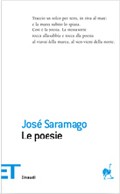
Einaudi
1996 (Translated by Fernanda Toriello) (included in the works Poesie and Le Poesie)
Language
Italian
«Piú che le parole e le immagini… ci vengono incontro le espressioni di chi ben sa di essere Poet e che può affermare che solo gli occhi del Poet Podeno Riscattare e Accendere di nuovi significati, fin a farne una 'lingua dell'altro mondo', le parole piú semplici e quotidiane‘.
Luciana Stegagno Picchio
This volume presents the due conclusion of the poetry of the Nobel Prize for Literature 1998: Possible Poems and Probably Joy. Il cousin, Le poesie possibili, came pubblicato in 1966, ma poi rivista and amended in 1982, tentatively, on the part of the «romanziere di oggi», di «grattare con unghia secca e ironica il Poet di Ieri». The second, probably happy, is the beginning of the 1970s, and will not rise to the same sensibility until now. Ed is a poetic opera that, splendidly, merits a long and successful visit to the light of the great narrative production of the successive period in the beginning, from the Handbook of painting and calligraphy, from 1977, to a recent peak.
